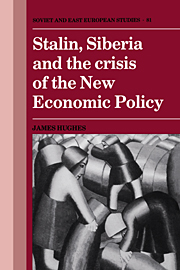Book contents
- Frontmatter
- Contents
- List of tables
- Preface
- Note on transliteration and dates; weights and measures
- Map of Siberia in 1928
- Introduction
- 1 The Siberian peasant utopia
- 2 The party and the peasantry
- 3 Who was the Siberian kulak?
- 4 The crisis of NEP
- 5 The end of NEP
- 6 The emergency measures
- 7 The ‘Irkutsk affair’
- Conclusion
- Appendix
- Glossary
- Notes
- Bibliography
- Index
- Book List
- Frontmatter
- Contents
- List of tables
- Preface
- Note on transliteration and dates; weights and measures
- Map of Siberia in 1928
- Introduction
- 1 The Siberian peasant utopia
- 2 The party and the peasantry
- 3 Who was the Siberian kulak?
- 4 The crisis of NEP
- 5 The end of NEP
- 6 The emergency measures
- 7 The ‘Irkutsk affair’
- Conclusion
- Appendix
- Glossary
- Notes
- Bibliography
- Index
- Book List
Summary
In this chapter we shall be concerned with the causes of the grain procurement difficulties in the last quarter of 1927, which erupted into a full scale crisis of NEP in January 1928. In particular, we shall examine the extent to which there were regional variations or peculiarities in the impact of the factors contributing to the crisis. In fact it should be said that this crisis was simply the climax to a series of convergent crises which had been gathering steam in the course of the mid-1920s and, indeed, one scholar described it as the ‘coup de grâce’ to NEP. The grain crisis of 1927/8 was not an isolated incident in the history of the mid-1920s, for of the four grain procurement campaigns between 1924 and 1927 only one, that of 1926/7, proceeded without a crisis of some sort.
The nature of the difficulties encountered by the Bolsheviks in their relations with the peasantry in this period lay in the explosive mix of political and economic ingredients which formed NEP. The fundamental principle of NEP was the smychka and, as we have seen in earlier chapters, this involved the party making political and economic concessions to the peasantry: subordinating the pace of industrial investment to the development of agriculture in order to stimulate peasant production and accumulation, and encouraging the peasants to join the party, Soviets and cooperatives.
- Type
- Chapter
- Information
- Stalin, Siberia and the Crisis of the New Economic Policy , pp. 97 - 122Publisher: Cambridge University PressPrint publication year: 1991



